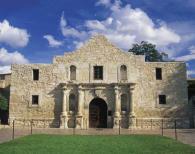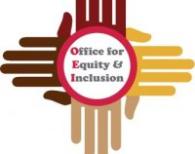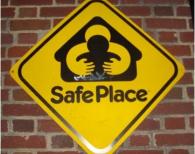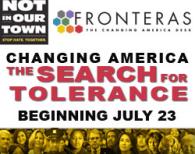This is a background piece on the meaning of a "hate crime" in the five-part series published by our public media partners at Fronteras.
Defining Hate Crimes
By Jude Joffe-Block
PHOENIX — This week we launch our five-part Fronteras Desk series, The Search For Tolerance. Five reporters in five cities checked on the ways that communities are trying to prevent hate crimes. The stories air on several public radio stations in the Southwest this week.
But as communities work to prevent hate, a question often arises when some form of harassment or discrimination does occur: Was that a hate crime?
During the last few decades, the vast majority of states have added hate crime laws to their books. These statutes allow longer criminal sentences if there is evidence that a crime was motivated by bias.
At a recent town meeting in the Phoenix suburb of Gilbert, concerned residents and the police chief entered into a dialogue about the legal definition of a hate crime.
Fronteras

This is the fifth and final piece of a five-part series published by our public media partneras at Fronteras. Listen to the accompanying radio piece.
By Adrian Florido
Hate Crimes in the Alamo City
SAN ANTONIO, Texas — San Antonio is known as a Mexican-American city. Yet it’s also home to a small but vibrant South Asian community, including Muslims and Sikh religious followers.

This is the fourth in a five-part series published by our public media partners at Fronteras. Listen to the accompanying radio piece.
New Mexico School Seeks to Serve Black Students
By Elaine Baumgartel
ALBUQUERQUE, N.M. — New Mexico often touts its tri-cultural diversity: a white minority population, a Hispanic majority and nearly two dozen Native American tribes.
But the African-American community there is teenie, almost invisible. That makes it more difficult for black students at the University of New Mexico, where four out of five African-American men don’t graduate.
The Fuller family moved their six children to Albuquerque to take advantage of New Mexico’s in-state scholarship programs. Jason Fuller left all of his high school friends behind in his hometown of Detroit, a city that’s more than three-quarters African-American. His new home is a dusty, sprawling city in the middle Rio Grande Valley, where African-Americans make up just 3 percent of the population

This is the third in a five-part series published by our public media partneras at Fronteras. Listen to the accompanying radio piece.
By Adrian Florido
LGBT Group Builds Support In Southern Arizona
TUCSON, Ariz. — In Tucson, Ariz., a nonprofit group is working to reduce hate and bias against the LGBT community. It’s called Wingspan and it is doing so through education; training even government organizations about tolerance within the ranks.
Inside the airy rooms of Studio One, a group of artists is meeting on a late Saturday afternoon. The logistics are a little daunting but they have no shortage of volunteers. They are preparing for a Latino gay pride festival.
The circle of artists brings together burlesque performers, photographers, event planners, singers, dancers and poets.

This is the second in a five-part series published by our public media partneras at Fronteras. Listen to the accompanying radio piece.
By Adrian Florido
SAN DIEGO — Detective Ellen Vest investigates hate crimes for the San Diego County Sheriff’s Department, and she recently recalled a case in which a white skinhead attacked an African-American man outside a bar, causing brain damage.
Vest thought the assault was a hate crime.
“He had one swastika on his shoulder that he displayed to our African-American victim. So we served a search warrant on his house,” she said of the suspect, who was ultimately convicted. “He had a money clip that had a little KKK man on it, with a burning cross. He didn’t have a lot, but what he did have was really pretty specific to show he was a biased individual.”
To convict a suspect of a hate crime, proving that bias is critical. And for detectives like Vest, one of the best ways to do that is by looking for those hate symbols.

This is the first in a five-part series published by our public media partneras at Fronteras. Listen to the accompanying radio piece.
By Jude Joffe-Block
PHOENIX — Gilbert, Ariz. is a bedroom community outside of Phoenix that has seen explosive population growth in recent decades. As it grew from a small, conservative farming town into a more diverse community, some notable tensions arose.
“In 1993, our detectives started to identify in the town of Gilbert a gang that called themselves White Power,” said police spokesman Sergeant Bill Balafas.
Six years later, a spin-off gang called the Devil Dogs emerged among football players at Highland High School.
“Their belief system, we learned, was for white people and anti everything else,” Balafas said. “So they were racists, but that didn't mean they didn't beat up white people, they just beat up everybody.”

Tune into this original Not In Our Town programming from our public media partners at Fronteras.
We asked you this question in October 2011: Does your community make you feel safe and included, or scared and marginalized?
The Fronteras: Changing America Desk has joined forces with Not in Our Town documentary producers to determine how hate affects communities throughout the Southwest and what people like you are doing about it.
Tune in to hear these stories on KJZZ at 6:30 and 8:30 a.m. during Morning Edition

A Latina resident of Phoenix stepped up to the microphone, her voice cracking, nearly tearful.
“Why do they hate us?” she began. “That’s what my seven and eight-year-old niece and nephew—who have been in this country all their lives—ask me when they hear what people say about immigrants here in Arizona.”
The woman spoke to Patchogue, NY Mayor Paul Pontieri in a packed theater in February, following a screening of Not In Our Town: Light in the Darkness. Pontieri was sharing his experience during the aftermath of the hate crime killing of Marcelo Lucero and attacks on local immigrants in 2008. He spoke with compassion and conviction about the need to dampen dehumanizing rhetoric against immigrants, most especially because of its effects on children and young people. Pontieri was formerly a middle school assistant principal.
